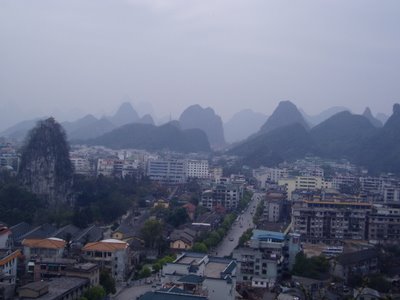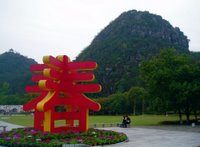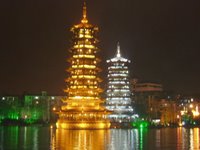In Chinese, "Moutain" + "Water" = "Scenery"
I would eventually make it back into China, though with less time and much less cash than expected. But this wasn't going to upset a seasoned China Traveler such as yours truly too much: there was adventure to be had.
But first I had to get to that adventure. The successful route went as such: from Wan Chai on Hong Kong island I boarded a bus that took me to the border crossing in ShenZhen. Getting through immigration (yes!) I found another bus to go to GuangZhou.
GuangZhou, someone once told me, was the "Los Angeles of China." Taking a quick look around, I agreed: GuangZhou was huge and there was nothing to hold my interest to keep me there any longer than I needed to be. I strolled a few kilometers to find the train station, bought a ticket, then ran some errands, one of which meant going to a bank (I had a handful of HK$ left in my pocket that was now useless). Going to the bank never really scored high on my excitement chart, but my eyes bulged when I witnessed the wad the woman whipped out (more alliteration! more GENIUS!). Hefting two bulging plastic shopping bags, little ol' Grandma dumped piles upon piles of 100RMB notes on the counter. There was easily more than I had earned within my year's salary. Why so much cash had taken so long to reach the safety of a bank, I don't know, but I'd heard that many Chinese are skeptical of stowing their savings away anywhere they can't see it. As for the shopping bags: anyone's guess.
Eventually the train would depart, me in my sleeper bunk. Early the next morning (around 6AM) we hit my destination: GuiLin.

 There are so many proverbs, folktales, and historical anecdotes attesting to GuiLin's scenery that little is left to be said. Apparently this region of China was once submerged under the sea, leaving incredibly drastic karst formations every which place you look. Civilization creeped in around this uprisings and along rivers like the Li. And since my bags were safe in my hotel room by 7:30 AM, I had plenty of time that first day to take as much in as I could.
There are so many proverbs, folktales, and historical anecdotes attesting to GuiLin's scenery that little is left to be said. Apparently this region of China was once submerged under the sea, leaving incredibly drastic karst formations every which place you look. Civilization creeped in around this uprisings and along rivers like the Li. And since my bags were safe in my hotel room by 7:30 AM, I had plenty of time that first day to take as much in as I could. Much of GuiLin followed the tried and true civil planning of any Chinese city: big public square, market street, pedestrian/high end shopping street, park, temple, etc. And while all this was everything I had seen before, GuiLin executed it in a laid back manner that made everything their own. If only for the constant reminder supplied by those huge rocky up-croppings. I'd spend a log of time walking a few streets and playing it easy here; sure enough if there was any time during my travels in China when I actually slowed my pace and relaxed; it was here in GuiLin.
Much of GuiLin followed the tried and true civil planning of any Chinese city: big public square, market street, pedestrian/high end shopping street, park, temple, etc. And while all this was everything I had seen before, GuiLin executed it in a laid back manner that made everything their own. If only for the constant reminder supplied by those huge rocky up-croppings. I'd spend a log of time walking a few streets and playing it easy here; sure enough if there was any time during my travels in China when I actually slowed my pace and relaxed; it was here in GuiLin. Lazy mornings spent in coffee shops along the boulevard. Strolls up, around, and under hallowed rocks. Nights sitting on the promenade enjoying frozen treats as fishermen hawked sampan tours. Meals of noodles with horse meat and "beer fish." I'm not sure what "beer fish" is, but I present Exhibit A in the argument for culinary synergy. As for horse meat: not as tender as donkey, nor nearly as flavorful.
Lazy mornings spent in coffee shops along the boulevard. Strolls up, around, and under hallowed rocks. Nights sitting on the promenade enjoying frozen treats as fishermen hawked sampan tours. Meals of noodles with horse meat and "beer fish." I'm not sure what "beer fish" is, but I present Exhibit A in the argument for culinary synergy. As for horse meat: not as tender as donkey, nor nearly as flavorful.A couple years ago a fellow Hoya and SFSer came through this town and left an indelible mark. I guess he gave some speech on global environmentalism and preserving natural wonders. His name was also Bill. You might have heard of him. This Bill left a mark of his own, well, maybe more of a memento. But I guarantee whoever found them won't forget them anytime soon.


0 Comments:
Post a Comment
<< Home